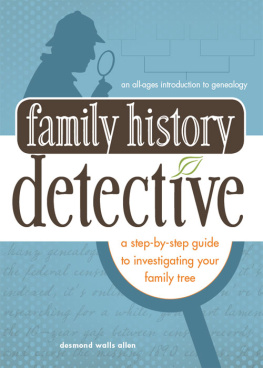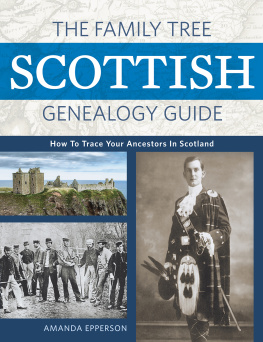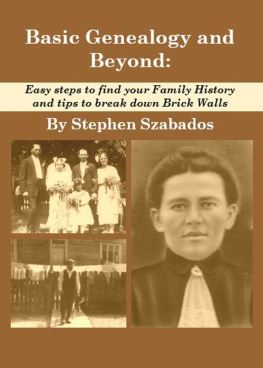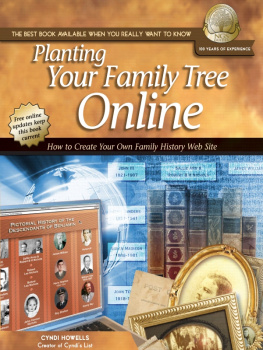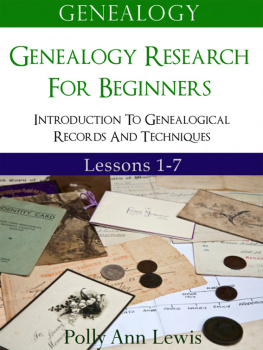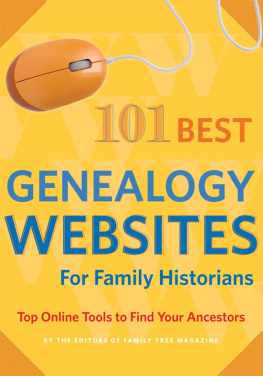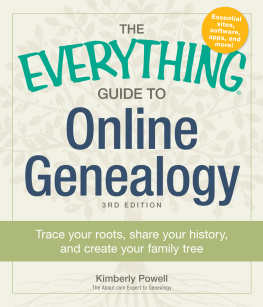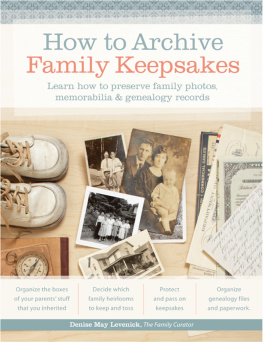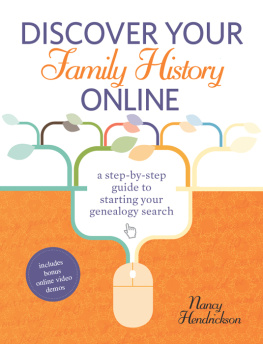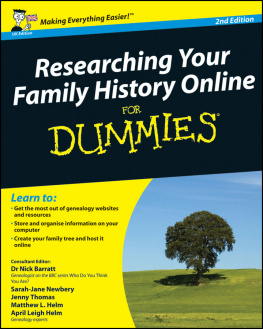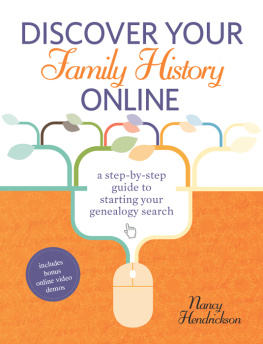a step-by-step guide to investigating your family history
family history
detective
desmond walls allen

Cincinnati, Ohio
shopfamilytree.com
About the Author
Desmond Walls Allen has taught seminars and workshops on genealogical topics for twenty-five years. She is the owner of Arkansas Research, Inc., a historical and genealogical publishing company devoted to Arkansas resources. She appeared as a guest expert in the first PBS Ancestors series, and has hosted Arkansas Educational Television Networks Researching Your Family Tree. Desmond is the author, compiler, or editor of 237 books. She has written many articles on genealogical and historical research methods. And shes a member of MENSA, the international organization for people who have IQs in the 98th percentile and above.

Dedication
Martha Vaughn, aka Patsy
the Witch. This photo of Patsy the Witch was taken around 1900 when Patsy was in her early nineties. A distant cousin of minealso a descendant
of Patsysent me the picture.
Dont be afraid to contact relatives you only just discoveredthey may want
to share information as
much as you do!
Acknowledgments
My ancestor, Martha Patsy the Witch Vaughn, deserves credit for my initial interest in genealogy. My great-grandmother told me about her great-grandmother, a woman who could predict the future, cast spells, and change people into animals. Patsy the Witch dangles at the bottom of my pedigree charther line is my maternal one, the whole way. I found her and her maternal grandmother as well.
This book wouldnt have been possible without the people from whom I learned research methods and all those students I, in turn, taught to do genealogy. The questions and stories from my students helped me decide what novice genealogists need to know.
My sincerest appreciation goes to my mother, Elizabeth O. Williams Walls, for her unconditional love and encouragement. My son, Hadley Edward Hirrill, and granddaughter, Hali Elizabeth Hirrill, continue to inspire me to research and write about our family.
The first edition of this book was written in 1998, and Im astonished at how much has changed in the field of genealogy since then and now (2011) with the second edition. The Internet, with its tremendous resources and the opportunity it presents to connect people, is an amazing thing.
introduction
I wrote this book from a selfish standpoint, and I thought perhaps youd like to know why. When I first started on my family history pursuit, I thought of it as a search for my ancestors. Through the years, I discovered the people who turned up in my pedigree arent just my ancestorstheyre the ancestors of lots of folks. My ancestors may be your ancestors. And if youll get busy and involve yourself in the research process, perhaps youll solve some of the problems about our ancestors I havent been able to.
I used to write a genealogy column for a newspaper, so I received lots of interesting mail. One researcher wrote, saying he was positively alarmed about the number of his ancestors when he did the mathematical computation to learn how many ancestors were back there. He knew he had two parents, four grandparents, eight great-grandparents, and so on. So he took pencil in hand and started working out how many ancestors he was descended from in the one hundredth generation. (Go ahead, try this yourself. Your calculator wont handle the final results, so be prepared to do math the old-fashioned way.)
My correspondent got back to ten generations with his pencil and figured he was descended from 1,024 people in that generation. I can imagine a crowd of that size; you probably can, too. But when he reached twenty generations, he counted over a million peopleslightly less than the current population of the entire state of Maine. If you dont get bogged down in the zeros, work back to 100 generations and youll arrive at a number that boggles the mind. I had to use an encyclopedia to determine what numbers that large are called. The figure is 1,267,700,000,000,000,000, 000,000,000,000. In laypersons terms, thats a little over 1.2 nonillion ancestors in the 100th generation.
The Oxford American Dictionary estimates a generation as thirty years. So one hundred generations would put us back to about 1000 b.c. Then we arrive at a problemthere werent that many people on the earth. (And those were only his ancestors.) The population of the world in 1650 was only about 500 million people.
Where had his thinking gone astray? He isnt descended from 1.2 nonillion different people who were exclusively his ancestors. He is the product of one hundred generations of intermarriage among the worlds population. If you have New England ancestry, youll probably discover many of your lines go back to just a few ancestral couples who came over in the seventeenth century. Their descendants intermarried.
The United States is a country on the move. We dont stay in the same location for dozens of generations like people of other countries did in historic (and prehistoric) times. So our pedigree charts are fairly diverse. But it isnt always so. Several years ago, the news media ran stories about a man in an English village whose DNA matched that of a prehistoric skeleton. The stories said he was probably related to most of the people in the town. And some of us whose ancestors left that town for America a couple of hundred years ago are probably related to that skeleton, too.
Its when we begin to see the big picture and think about all those ancestors of ours who wove the fabric of our pedigree that we realize were all part of a global family.
So, cousin, start working on your family history research. Be sure to read the chapter on sharing your family history research, because I want to know what you find out about our family.
STEP 1
WHERED YOU GET THOSE EYES ?
The Why, What, and How of Family History
L ook in the mirror: Everything you see came from your ancestorsyour eyes, the shape of your face, the length of your nose, and a hundred other features staring back at you. You inherited personality traits, disease predispositions, and thousands of features you cant see. Who are you? Youre the product of your ancestors gene
pool. Scary thought? Perhaps its time for you to learn more about all those people who contributed to your makeup.
WHY
Think about why you want to know about your ancestors. Your interest in genealogy may come from ordinary curiosity about all the people who contributed to who you are. Genealogy research is not just about your ancestorsits about self-discovery. Youll learn more about yourself when you hit the pedigree trail.
If youre curious about your ancestors, youve probably reached the point in your life where you can turn inward. When people are young, theyre often preoccupied with earning a living and rearing children. Somewhere in the growth process, your thoughts become introspective. You begin to want answers to questions such as, Why am I like I am?
Perhaps you have a medical problem and wonder if something in your genetic makeup contributed to the situation. You can learn who your ancestors were, and attempt to discover their causes of death. Were reading more and more in the news about the importance of genetic research, and you may wonder where your genes came from and whether or not you may have inherited tendencies that leave you vulnerable to particular diseases.

